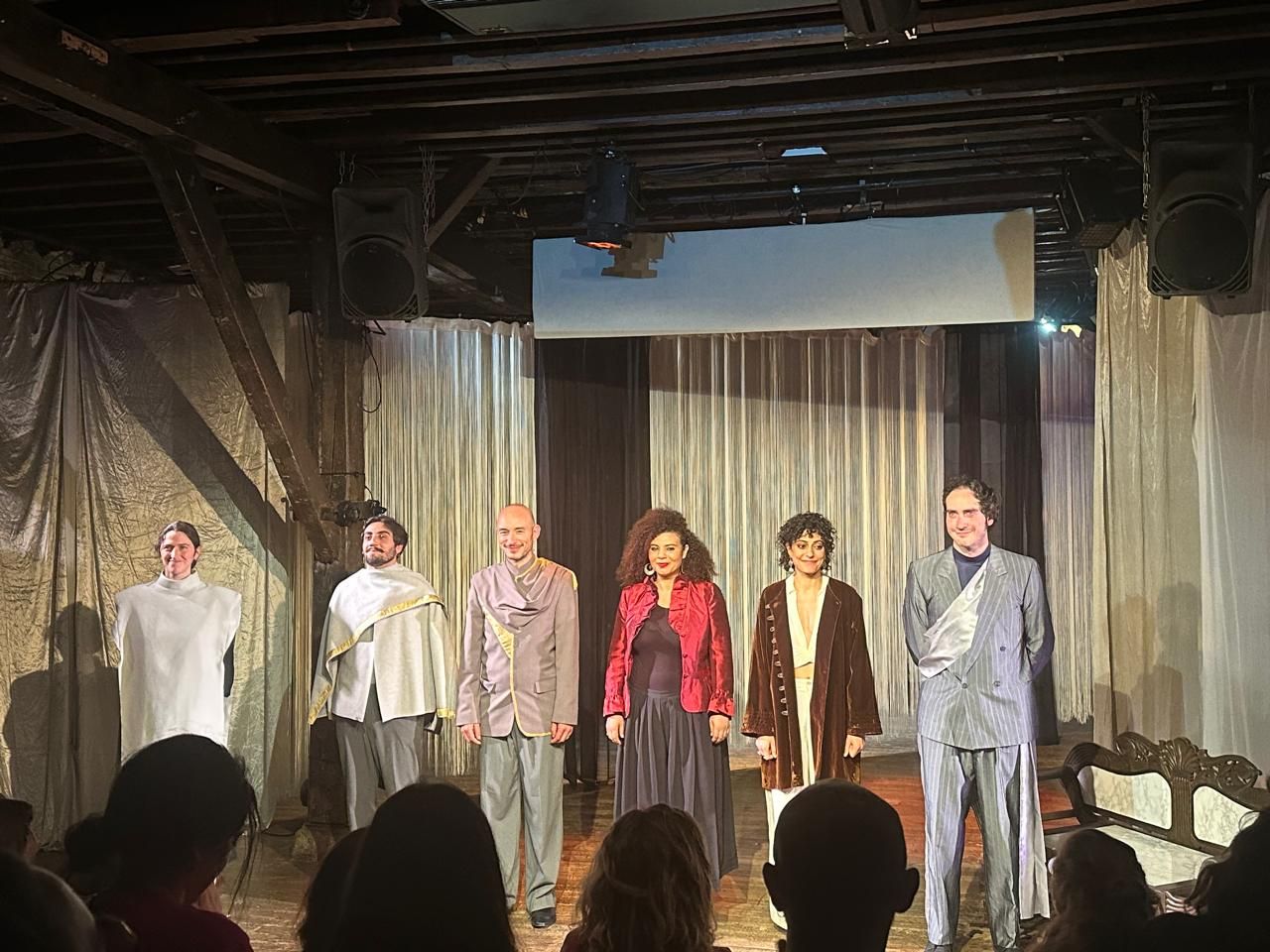
After a run at the Lavoir Moderne Parisien, the bilingual version of Bérénice is set to appear this summer at the Festival d’Avignon.This bold adaptation, directed by Marie Benati and Sanae Assif, brings together Racine’s classical French alexandrines and literary Arabic. Performed by a multicultural cast, the play reimagines the classic tragedy through the lenses of exile, forbidden love, modern cultural divides, and the lines—both literal and symbolic—that separate or unite us.
The play Bérénice at the Lavoir Moderne Parisien is co-directed by Marie Benati and Sanae Assif. Love exists in exile across ninety intense minutes, during which Racine’s unyielding verses intertwine with their poetic Arabic translation. The cast—Sanae Assif, Ghina Daou, Edouard Dossetto, Leslie Gruel, Adam Karoutchi, and Majd Mastoura—deliver performances that are deeply inhabited, layered, and emotionally resonant. Lighting design by Raphaël Bertomeu and sound design by Osloob heighten the atmosphere, while Pierre Mengelle’s scenography grounds the entire vision.
“In bringing Racine’s masterpiece to life in both French and Arabic, we’re placing political questions at the heart of a love story. In this tale, where xenophobia plays a leading role, poetry—whether Racine’s alexandrines or the lyrical Arabic translation—becomes a bridge: between people, between cultures, an instrument of love and resistance,” the collective writes in its artistic statement.
The story picks up after eight days of mourning for Emperor Vespasian. His son Titus ascends to the throne, and all eyes in Rome turn to one name: Bérénice. Will the Emperor publicly declare his love for a woman from Palestine? Is Rome ready to see a foreign queen walk among the Caesars?
After early performances in Paris, the collective now sets its sights on Avignon this summer. This ambitious undertaking first took shape as a staged reading last year at the Institut du Monde Arabe. The success of that reading—in both French and literary Arabic—paved the way for a full production this year. And what a production: symbolic and stripped down, anchored in a mesmerizing interplay of shadow and light. The result is dreamlike, transporting the audience to a liminal space, somewhere between reality and fiction. The silence speaks, the bodies break Racine’s traditional codes—they touch, embrace, burn with passion. Amid long-held tensions, unspoken words, linguistic and cultural gaps, and the weight of silence, they finally give in to a deeper call—the call of souls.
The choice to use both languages, while at first surprising in Racine’s rigid world, is entirely justified. Bérénice is the eternal outsider—exiled, never truly at home, always seen as “too much.” She’s a woman driven by irrational passion, confronting the cold nobility of duty. And yet, she confesses her love with unwavering dignity, in every language she can claim as her own: her mother tongue… and the other. And what is that mother tongue, if not the language of Racine himself—the ultimate language of love, passion, and poetry?
Onstage, where everything seemed fragile yet held by an unbreakable thread, the role of the servants was beautifully honored. Dressed like Roman soldiers one moment and Star Wars characters the next, they embodied the fusion of classical and contemporary, bridging cultures, desires, differences, and wounds. The result spoke powerfully to audiences of all backgrounds.
The actors’ distinct accents, their fluency in one language or the other, their physical expressiveness—all conveyed lived emotional truths. Each character pulsed with authenticity. Racine’s sacred alexandrines were transformed, repurposed into tools of a different culture, illuminating not only the characters’ backstories but also the senselessness of war—and, in fleeting glances or tears, their own quiet personal stories. The audience hung on every word, as the stage in the heart of Paris was filled with emotions that felt at once foreign, intimate, and universally human.
One thing is certain: the troupe’s passion and persistence have paid off. Scene after scene, their bilingual hymn to impossible love continues to win hearts. We’re keeping our fingers crossed for Avignon this summer.

Comments